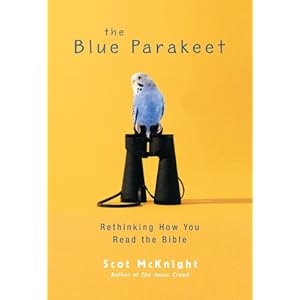After a good break, I began to take in new thoughts, ideas, books, blogs to further explore. One interesting person I've found is a New Testament scholar named Scott McKnight. Scott might be best known for his book Jesus Creed which I recently finished. But I'd like to talk about his most recent book The Blue Parakeet: Rethinking How You Read the Bible.
In the book Scott talks about how there are passages in the Bible that stand out and are hard to explain. One point he makes in the book that has spoken to me is about selective Bible reading.
When I was growing up and began to read my Bible for myself, I noticed that there were some difficult to understand passages in it. Going to Sunday school, and later youth group I was taught that we were to follow and obey all the words of the scriptures. But here was the growing problem: I noticed that Christians would follow some verses and not others. It's not that they were willfully disobeying scriptures it's just that it seemed to me they were taking some passages more seriously than others. Let me give an example:
"Now I want you to realize that the head of every man is Christ, and the head of the woman is man, and the head of Christ is God." 1 Corinthians 11:3
"If a woman does not cover her head, she should have her hair cut off; and if it is a disgrace for a woman to have her hair cut or shaved off, she should cover her head" 1 Corinthians 11:6Why is it that there are so many churches that are quick to jump on 1 Cor. 11:3 to show that men are to be the head or leaders of women but no one (or very few) practice 1 Cor. 11:6 and require their women to cover their heads in prayer? Do we just pick the verses we like and support our opinions and throw out the ones we disagree with?
This is just one example of dozens I could point out. At first glance it appears that Christians follow what they want in the Bible and ignore that which they don't like or agree with.
What if there is another way to read the Bible that doesn't result in us holding some verses over others or picking and choosing what we will believe and follow? What if the Bible as a whole is saying something about God and His story and interaction with humanity? What if the Bible is more complex and nuanced than we were once taught? And what if the Holy Scriptures were never meant to be read and understood alone by ourselves in our "personal devotions?"
Recently I've been searching for a way to read the Bible while recognizing it's mystery, difficulties, and with an understanding that we can't just cut up the Bible into little bite size verses, yank them out of context and base whole belief systems on them. Scott McKight's book The Blue Parakeet is beginning to show me a way forward from: How do I understand the Bible? To: How do I live the Bible?
Your thoughts? What are some examples you've seen of selective Bible reading? How do we learn to follow all of God's word and not just parts?
